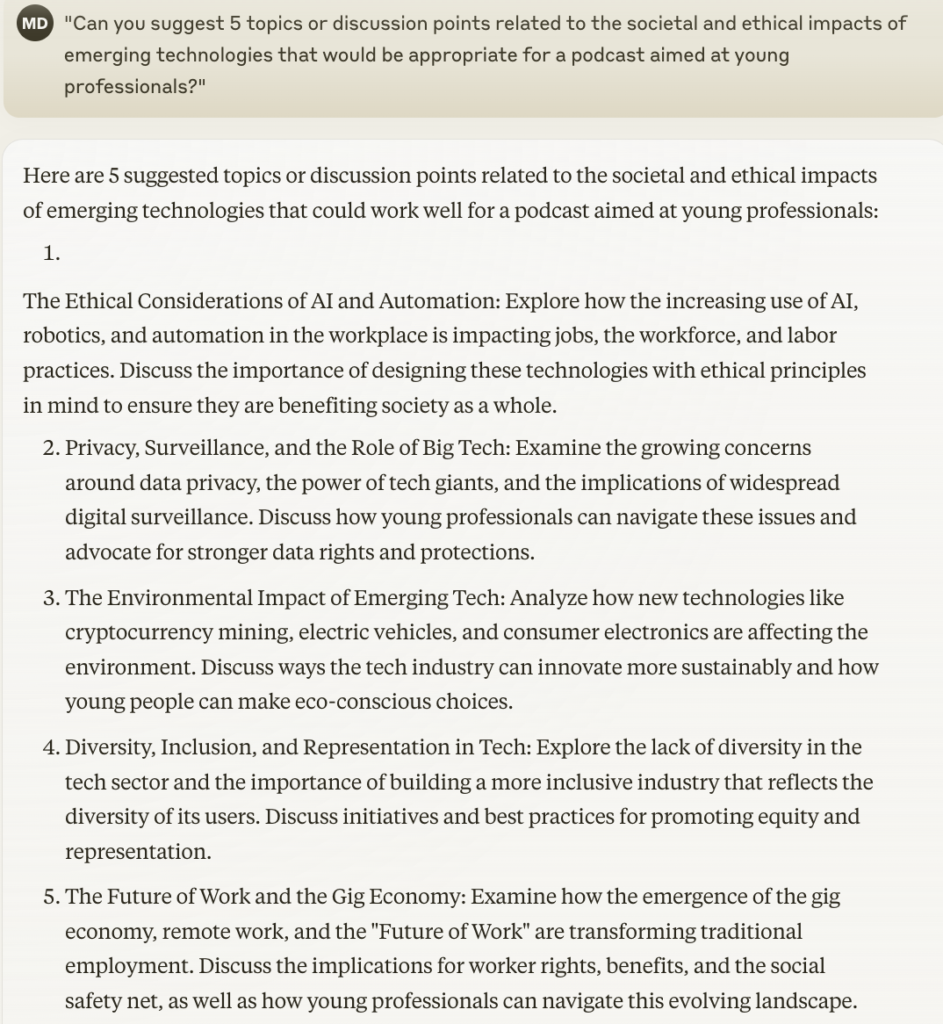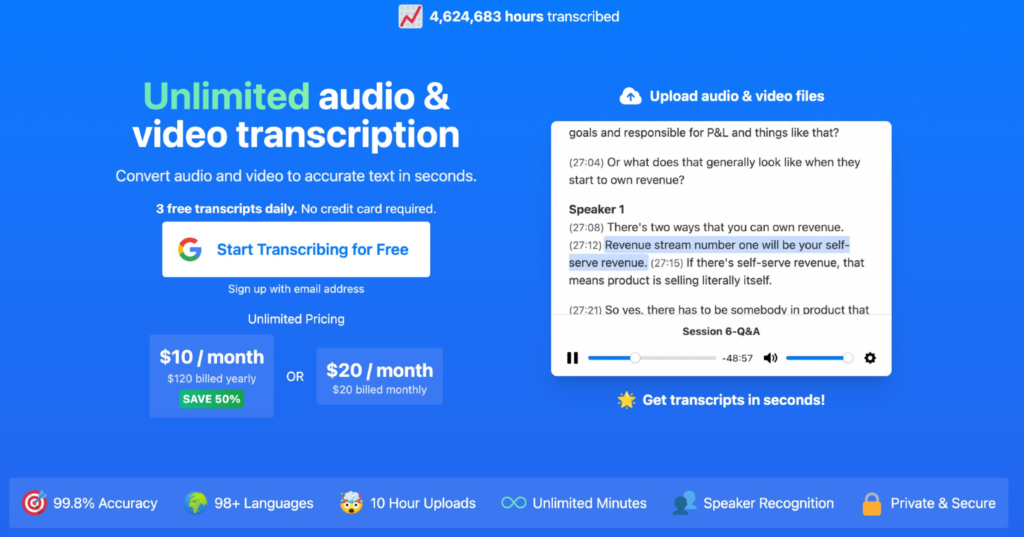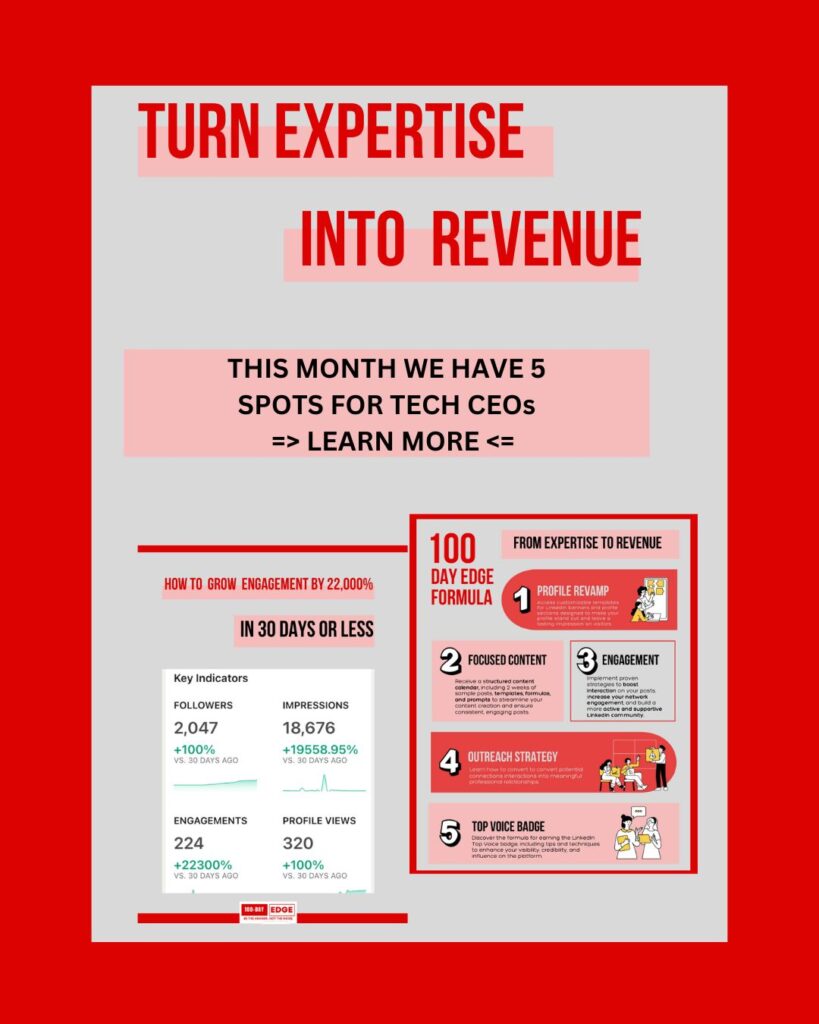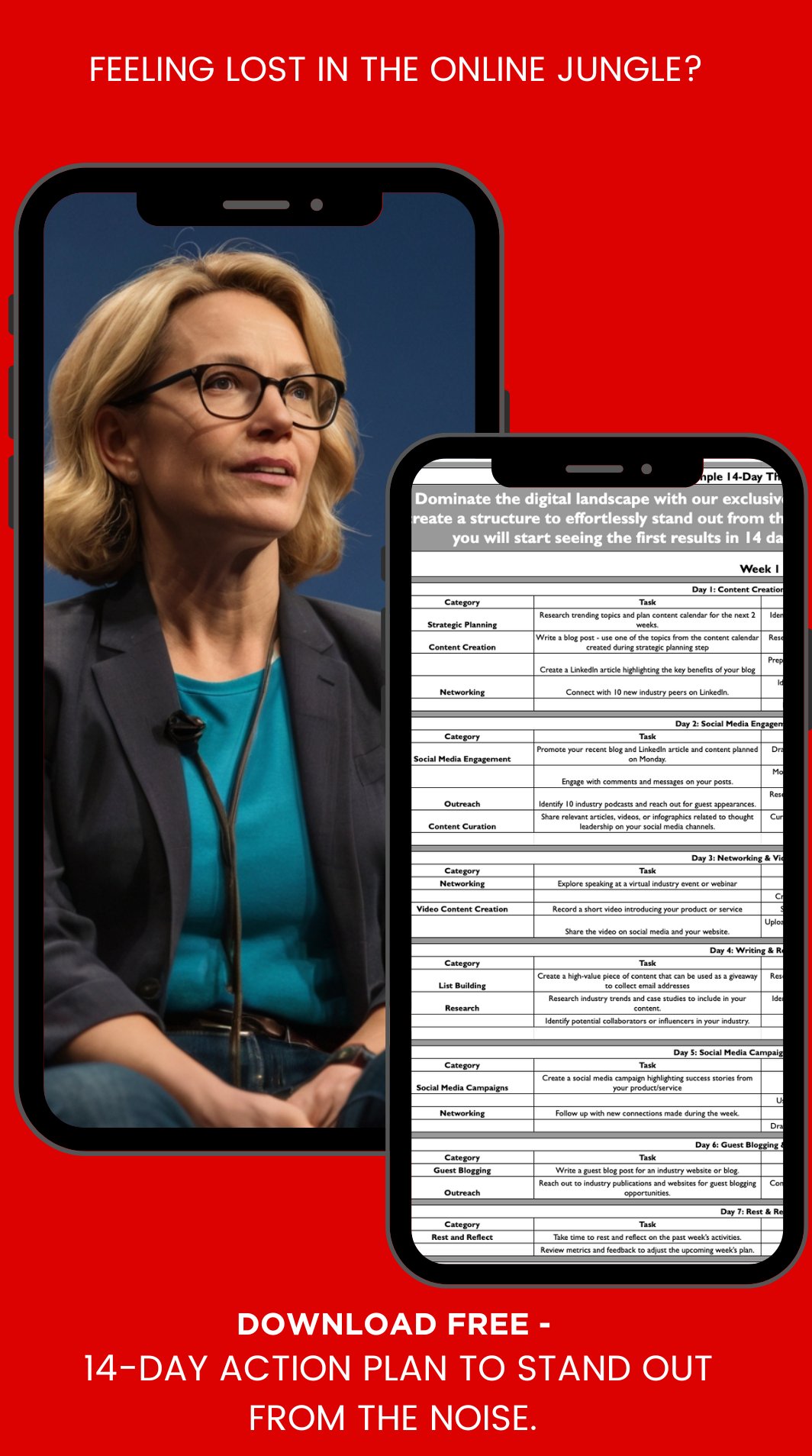As a podcaster, you know the struggle of trying to consistently come up with fresh, engaging content ideas for your show.
It can feel like an endless battle against creative block, sapping the enthusiasm and momentum you need to keep your podcast growing.
But what if you had a reliable brainstorming partner – one that’s available 24/7 and ready to provide tailored suggestions based on your unique podcast, audience, and goals?
Enter AI – the powerful ally that can revolutionize your podcast creation process from start to finish.
In this comprehensive guide, we’ll explore how you can harness the power of AI to streamline and elevate every stage of your podcast – from topic research and guest outreach to scriptwriting, content repurposing, and even listener engagement. Get ready to wave goodbye to creative slumps and hello to a new era of podcast success.
Table of Contents
ToggleHow Can AI Enhance My Podcast Topic Research?
Generating unique, attention-grabbing topics is the foundation of any successful podcast. But for many creators, this crucial first step can feel like hitting a wall – no matter how many brainstorming sessions you have, the ideas just don’t seem to flow.
This is where AI steps in as the ultimate brainstorming partner. With just a bit of context about your podcast’s niche, target audience, and goals, an AI assistant can provide a seemingly endless supply of fresh, relevant episode ideas.
For example, let’s say you host a technology podcast aimed at young professionals interested in the latest tech trends. You could prompt the AI:
“Can you suggest 5 topics or discussion points related to the societal and ethical impacts of emerging technologies that would be appropriate for a podcast aimed at young professionals?”
The AI would then respond with a list of potential topics, such as:

And the list goes on.
By experimenting with different angles and prompts, you can keep tapping into the AI’s vast knowledge base to generate a steady stream of fresh, engaging topic ideas.
But the benefits of AI-powered topic research don’t stop there. An AI assistant can also help you dive deeper into specific subjects, providing focused research and insights to inform your episode planning. For example, you could ask:
“Summarize the key ethical concerns around the use of facial recognition technology, and suggest 3 angles I could explore for a podcast episode on this topic.”
This allows you to uncover unexplored avenues and identify narratives that will resonate with your audience – all without having to spend hours sifting through disparate sources yourself.
Can AI Help Me Write Better Podcast Scripts?
Once you’ve nailed down your podcast topics, the next challenge is crafting compelling, polished scripts that capture your listeners’ attention. From drafting engaging introductions to refining sentence structure, an AI assistant can be an invaluable collaborator in the scriptwriting process.
Start by using the AI to outline the key points and flow of your episode. For example:
“Create a detailed outline for a 30-minute podcast episode on how social media impacts mental health, with sections on the positive and negative effects, tips for healthy social media use, and expert commentary.”
With this framework in place, you can then dive into the actual scripting, using the AI to provide suggestions and refinements at every step. For your introduction, you could prompt:
“Write an engaging 2-minute introduction for a podcast episode on how social media affects mental health, targeting young adults.”
The AI might respond with something like:
“Social media has become an inextricable part of daily life for many young adults, offering both connection and constant comparison. But what impact is this digital world having on our mental wellbeing? In this episode, we’ll dive into the complex relationship between social media and mental health – exploring both the potential upsides and the hidden pitfalls. You’ll hear from experts on practical strategies for maintaining a healthy social media balance, as well as personal stories that shed light on this critical issue. By the end, you’ll have a clearer understanding of how to harness the power of social media while protecting your mental health. Let’s get started.”
From there, the AI can assist with refining the language, flow, and clarity of each section – ensuring your script reads as polished, engaging, and true to your podcast’s unique voice.
“Suggest three ways to improve the clarity and conversational tone of this sentence: ‘Social media platforms can have both positive and negative effects on users’ mental wellbeing.'”
You are co-working with AI rather than relying solely on it. Think of it as an AI writing assistant at every stage. It will help you craft scripts that strike the perfect balance of information and entertainment, leaving your listeners eager for more.
I Struggle to Find Guests for My Podcast. Can AI Help?
Securing high-quality guests who bring fresh perspectives and expertise to your podcast is crucial for keeping your content engaging and relevant. But the outreach and booking process can be tedious and time-consuming – until you enlist the help of an AI assistant.
Whether you’re looking to expand your network or reconnect with past guests, an AI can streamline the entire guest procurement journey. Start by tapping into its knowledge base to identify potential interviewees:
“Generate a list of 10 experts in sustainable urban development who could be potential guests for a podcast episode on the future of cities.”
The AI can quickly provide a curated list of relevant individuals, complete with their backgrounds and contact information. From there, you can leverage the AI’s writing prowess to craft personalized, attention-grabbing outreach emails:
“Draft an invitation email for [Guest Name], an urban planning expert, to join our podcast and share their insights on sustainable city development.”
By automating these time-consuming tasks, you free up mental space to focus on building strong guest relationships and securing interviews that will elevate your podcast.
But the AI’s assistance doesn’t stop there. Once you’ve secured a guest, you can use the AI to help craft insightful questions, prepping you for a more dynamic, engaging conversation. For example:
“Suggest 5 thought-provoking questions I could ask [Guest Name] to explore the intersections between urban planning, climate change, and social equity.”
With an AI collaborator handling the logistical heavy lifting and ideation, you can devote your energy to hosting captivating, high-impact interviews that keep your listeners coming back.
What Are Some Effective Ways to Repurpose My Podcast Content?
As a podcaster, you’ve likely poured countless hours into creating engaging, informative episodes. But your podcast’s value shouldn’t be limited to its initial airing – by repurposing that content across multiple platforms, you can exponentially extend its reach and impact.
An AI assistant can be a powerful ally in this content repurposing process, helping you transform a single podcast episode into a diverse array of assets. For example, you could prompt the AI to:
“Convert the key takeaways from our episode on the future of remote work into a 1,000-word blog post targeted at professionals adapting to remote work trends.”
Or, if you want to create shareable social media content:
“Generate a 5-tweet Twitter thread highlighting insights from our podcast episode on sustainable urban development with [Guest Name].”
The AI’s natural language processing capabilities allow it to quickly identify the core messages and narratives from your podcast, then repackage that information into formats optimized for different digital channels. This not only saves you valuable time but also ensures a cohesive, high-quality experience for your audience, no matter where they engage with your content.
But the benefits of AI-powered repurposing go beyond just saving time. An AI assistant can also help you uncover new opportunities to extend the life of your podcast episodes. For instance, you could prompt:
“Suggest 3 ways I could repurpose the content from our episode on mental health in the workplace, such as a video series, an infographic, or a downloadable guide.”
By tapping into the AI’s creative problem-solving skills, you can breathe new life into your existing content and maximize its impact across your various platforms and formats.
Writing Show Notes Is Time-Consuming. Can AI Help With That?
Show notes are a crucial element of any successful podcast, providing listeners with quick access to episode highlights, key takeaways, and related resources. But let’s be honest – crafting comprehensive, SEO-optimized show notes can be a tedious, time-consuming task.
Start by getting the transcripts of the show I currently don’t have audio transcription capabilities, but you could transcribe your podcast audio through a service like Otter.ai, Descript, or Rev, which provide high-quality transcription.
Our personal favorite is Turboscribe – it allows you to do 3 transcripts per day for free.

Once you have the transcript, share it here, and Iit can help you craft summaries as well as detailed show notes.
For example, you could prompt the AI to:
“Create timestamped show notes for an episode featuring a panel discussion on the future of work, including key discussion points, guest bios, and relevant resource links.”
The AI would then provide a fully fleshed-out set of show notes, complete with timestamps, episode highlights, guest information, and links to additional resources. This not only saves you the time and effort of manually compiling these details but also ensures a consistently polished, informative experience for your audience.
And if you’re looking for a more condensed format, the AI can quickly generate episode summaries as well:
“Summarize the key talking points and takeaways from our podcast episode on the impact of AI on the job market, focusing on potential effects across different industries.”
By automating this essential step in your podcast production workflow, you free up valuable time and mental energy to focus on other high-impact areas of your show. Plus, your listeners will appreciate the readily available, AI-powered show notes that enhance the overall listening experience.
When using these tools, keep the following best practices in mind:
- Fine-tune the models on a dataset of podcast show notes for best results
- Combine multiple summarization approaches for more robust summaries
- Ensure the generated summaries are coherent, accurate, and concise
- Allow human review and editing of the AI-generated summaries
The right combination of these AI-powered tools can save a lot of time and effort in creating high-quality, informative podcast show notes.
How Can AI Elevate My Podcast Marketing Efforts?
As any seasoned podcaster knows, content creation is only half the battle – effective promotion is equally crucial for building a loyal, engaged audience. Fortunately, an AI assistant can be a powerful ally in your podcast marketing arsenal, helping you craft attention-grabbing assets that expand your reach.
Let’s start with episode titles – a make-or-break element that can make the difference between a listener pressing play or scrolling past. Rather than racking your brain for the perfect title, you can leverage the AI’s creativity and subject matter expertise:
“Suggest five attention-grabbing titles for a podcast episode on the future of AI in healthcare.”
The AI might respond with ideas like:
- “Healing with Code: How AI is Revolutionizing the Future of Healthcare”
- “Robotic Nurses and Digital Doctors: Navigating the AI Frontier in Medicine”
- “Predicting the Unpredictable: AI’s Role in Forecasting Medical Emergencies”
- “From Diagnosis to Prescription: Exploring the Clinical Applications of AI”
- “Humanizing Healthcare: Balancing AI Innovation with Empathetic Care”
By tapping into the AI’s language skills and industry knowledge, you can craft titles that pique listeners’ curiosity and accurately reflect your episode’s content.
But titling is just the beginning – the AI can also assist with crafting engaging social media posts, video scripts, and other promotional materials to spread the word about your podcast. For example:
“Write a 5-tweet Twitter thread to promote our episode on the benefits of meditation for mental health.”
With the AI’s help, you can ensure that your promotional efforts are as polished and appealing as the podcast episodes themselves, elevating your overall marketing strategy.
Can AI Help Me Engage More Effectively with My Podcast Listeners?
Building a loyal, engaged community of listeners is essential for the long-term success of any podcast. But fostering those vital connections can sometimes feel like a daunting task, especially when you’re juggling all the other responsibilities of running a show.
Fortunately, an AI assistant can lend a hand in strengthening your relationships with your audience. Whether you need to craft thoughtful responses to listener feedback or provide knowledgeable answers to their questions, the AI can help you communicate with your community in a more personalized, efficient manner.
For example, you could prompt the AI to:
“Write a thank-you message to a listener who left positive feedback about our recent episode on sustainable travel.”
The AI would then generate a genuine, heartfelt response that expresses your appreciation for the listener’s support and interest in your content.
Or, if a listener reaches out with a question about a topic you covered in a previous episode, you could ask the AI to:
“Draft a detailed response to a listener’s question about the ethical implications of AI discussed in our last episode.”
By leveraging the AI’s natural language processing capabilities, you can provide your audience with informative, empathetic responses that demonstrate your commitment to their engagement and learning.
Over time, these AI-powered interactions can help you cultivate a stronger sense of community around your podcast, fostering loyalty and meaningful connections with your listeners.
What Does the Future Hold for AI and Podcasting?
As the podcast industry continues to evolve and expand, the role of AI in podcast creation and promotion will only become more prominent. Already, we’re seeing a proliferation of AI-powered tools and technologies that are transforming every aspect of the podcasting workflow – from ideation and scripting to guest outreach, content repurposing, and audience engagement.
For example, Google Notebook will auto-generate a podcast for you with engaging hosts that will present your ideas in a fun and entertaining way.

How to Use AI to Grow Your Podcast
(AI-generated episode by Notebook)
And the future promises even more exciting advancements. As AI language models become more sophisticated, we’ll likely see the emergence of AI co-hosts and interviewers that can engage in natural, seamless conversations with human guests. AI-generated audio may also start to blur the lines between synthetic and human-produced content, opening up new creative possibilities for podcasters.
Ultimately, the convergence of podcasting and artificial intelligence represents an exciting frontier filled with untapped potential. By embracing these AI-powered innovations, podcasters can streamline their workflows, spark new levels of creativity, and forge stronger connections with their audience – all while riding the wave of this dynamic, ever-evolving medium.
Conclusion
The podcasting landscape is primed for transformation, and AI is the key that can unlock your podcast’s full potential. By harnessing the power of AI-powered tools and technologies, you can revolutionize every stage of your podcast creation process – from idea generation and guest outreach to scriptwriting, content repurposing, and audience engagement.
Whether you’re a seasoned podcaster or just starting out, integrating AI into your workflow can help you overcome creative blocks, boost your efficiency, and ultimately deliver a more polished, engaging listening experience for your audience. So why wait? Start exploring the world of AI-powered podcasting today, and watch your show reach new heights of success.

This month, my team is helping 5 technology leaders transform their expertise into tangible business results.
In 100 days, you’ll:
- Stage 1: Define your EDGE and optimize your online presence.
- Stage 2: Engage your tribe and land your first high-value client.
- Stage 3: Set your EDGE on fire with strategic content and recurring revenue.









